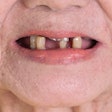
Medical costs are significantly lower for people with diabetes who receive treatment for periodontal disease, according to a new study presented at the American Association for Dental Research annual meeting in Tampa, Florida.
The research, which was funded by United Concordia, found that treating periodontal disease in patients with diabetes saved the healthcare system an average of $1,814 per patient in a single year.
Study author Marjorie Jeffcoat, DMD, a professor and dean emeritus of the University of Pennsylvania School of Dental Medicine, presented the findings at the meeting.
"I am interested in both the efficacy and cost-effectiveness of dental care as it relates to systemic disease," Dr. Jeffcoat told DrBicuspid.com.
Large-scale study
Dr. Jeffcoat and her colleagues conducted the study on a very large scale, collecting data from an insurance database that contained information on more than 1.6 million patients. Of that group, 91,454 patients had diabetes, and those are the ones the authors studied.
— Marjorie Jeffcoat, DMD
All study participants had Highmark medical insurance and United Concordia dental insurance.
The longitudinal study compared medical costs for subjects with diabetes diagnosed with periodontal disease who received periodontal treatment (773) with those for controls (60,706) who chose not to get treatment over a three-year period starting in 2007.
The average age of patients in the treatment group was 48 years; 55% were male and 45% were female. The no-treatment group was the same as the treatment group in terms of age; 53% were male and 47% were female.
The periodontal treatment group was treated for the disease in 2007 and received regular maintenance after that. The control group received incomplete periodontal therapy prior to the study and did not receive regular maintenance during the study.
At the end of the study, the researchers reported that the mean number of hospital admissions for the treatment group were 5.9, while mean hospital admissions for the control group were 9. Mean medical visits in the treatment group were 16.4, compared with 19 in the control group.
Hospitalizations and physician visits were reduced by 33% and 13%, respectively, in the subjects who received periodontal care when compared with controls, the authors noted.
In addition, medical costs were reduced by $1,814 per subject per year, with mean medical costs for the treatment group being $5,522, compared with $7,335 for the control group.
"While savings have been previously reported, the large number of patients studied makes us quite sure of the results," Dr. Jeffcoat said. "Our results are robust, save medical costs, and permit patients with diabetes to spend more time at work."
Three-year follow-up
The amount of individuals' data in this study makes it the largest of its kind and clinically significant, she added. Also of significance was the three-year follow-up period; other similar studies did not follow their patients over such long a period of time after dental treatment, the researchers noted.
"It is really a landmark study because of its size and three-year duration," agreed James Bramson, DDS, chief dental officer for United Concordia.
As a result of the study's findings, United Concordia will offer UCWellness, a disease-specific program that provides 100% coverage for maintenance following periodontal treatment, certain surgical procedures that treat gum disease, and removal of plaque and tartar in patients with periodontal disease. An important component of UCWellness is targeted education geared toward covered members with diabetes.
United Concordia is the first to offer this type and level of coverage to people with diabetes, noted F.G. Merkel, United Concordia president and chief operating officer.
This study is the first in a series of findings that will analyze the relationship between diabetes and other chronic diseases and conditions, such as heart disease, strokes, and pregnancy with preterm birth, Dr. Jeffcoat said.


















